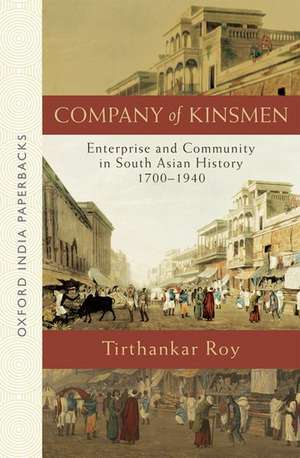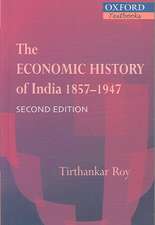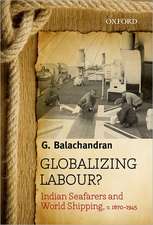Company of Kinsmen: Enterprise and Community in South Asian History 1700-1940: Oxford India Paperbacks
Autor Tirthankar Royen Limba Engleză Paperback – 12 apr 2018
Din seria Oxford India Paperbacks
-
 Preț: 155.82 lei
Preț: 155.82 lei - 23%
![Brass Baja: Stories from the World of Indian Wedding Bands [OIP]](https://i0.books-express.ro/bs/9780199474905/brass-baja.jpg) Preț: 158.82 lei
Preț: 158.82 lei - 22%
 Preț: 127.95 lei
Preț: 127.95 lei - 23%
 Preț: 133.53 lei
Preț: 133.53 lei - 23%
 Preț: 100.40 lei
Preț: 100.40 lei -
 Preț: 202.67 lei
Preț: 202.67 lei - 18%
 Preț: 141.83 lei
Preț: 141.83 lei - 21%
 Preț: 76.45 lei
Preț: 76.45 lei -
 Preț: 187.93 lei
Preț: 187.93 lei -
 Preț: 186.24 lei
Preț: 186.24 lei - 14%
 Preț: 44.43 lei
Preț: 44.43 lei -
 Preț: 113.68 lei
Preț: 113.68 lei -
 Preț: 155.25 lei
Preț: 155.25 lei -
 Preț: 90.15 lei
Preț: 90.15 lei -
 Preț: 85.67 lei
Preț: 85.67 lei -
 Preț: 71.63 lei
Preț: 71.63 lei -
 Preț: 94.41 lei
Preț: 94.41 lei - 11%
 Preț: 62.52 lei
Preț: 62.52 lei
Preț: 100.38 lei
Preț vechi: 129.72 lei
-23% Nou
Puncte Express: 151
Preț estimativ în valută:
19.21€ • 20.05$ • 15.90£
19.21€ • 20.05$ • 15.90£
Carte disponibilă
Livrare economică 03-10 martie
Preluare comenzi: 021 569.72.76
Specificații
ISBN-13: 9780199486809
ISBN-10: 0199486808
Pagini: 268
Dimensiuni: 143 x 216 x 17 mm
Greutate: 0.25 kg
Ediția:2
Editura: OUP OXFORD
Colecția OUP Oxford
Seria Oxford India Paperbacks
Locul publicării:Oxford, India
ISBN-10: 0199486808
Pagini: 268
Dimensiuni: 143 x 216 x 17 mm
Greutate: 0.25 kg
Ediția:2
Editura: OUP OXFORD
Colecția OUP Oxford
Seria Oxford India Paperbacks
Locul publicării:Oxford, India
Recenzii
This book, by a leading economic historian of South Asia, addresses a long-standing problem .. that of the dependent or independent role of social organization in the working of an economy .. [and] advances our understanding of an important economic region in both the past and the present. Sumit Guha (Journal of Interdisciplinary History)
The book makes an invaluable contribution to Indian economic history, business history, and global history more generally. It is a welcome addition for scholars working in these fields. Latika Chaudhary (Journal of Economic History)
'[A] real tour de force .. a creditable attempt to present a connected and conceptualized narrative of the great transition in the Indian economy from the eighteenth to the twentieth century.' Claude Markovits (Economic History Review)
The book makes an invaluable contribution to Indian economic history, business history, and global history more generally. It is a welcome addition for scholars working in these fields. Latika Chaudhary (Journal of Economic History)
'[A] real tour de force .. a creditable attempt to present a connected and conceptualized narrative of the great transition in the Indian economy from the eighteenth to the twentieth century.' Claude Markovits (Economic History Review)
Notă biografică
Tirthankar Roy is Professor of Economic History in the London School of Economics. He works on economic history, business history, history of development policy and the classical music of India.He is the author of The Economic History of India (3/e 2011)


